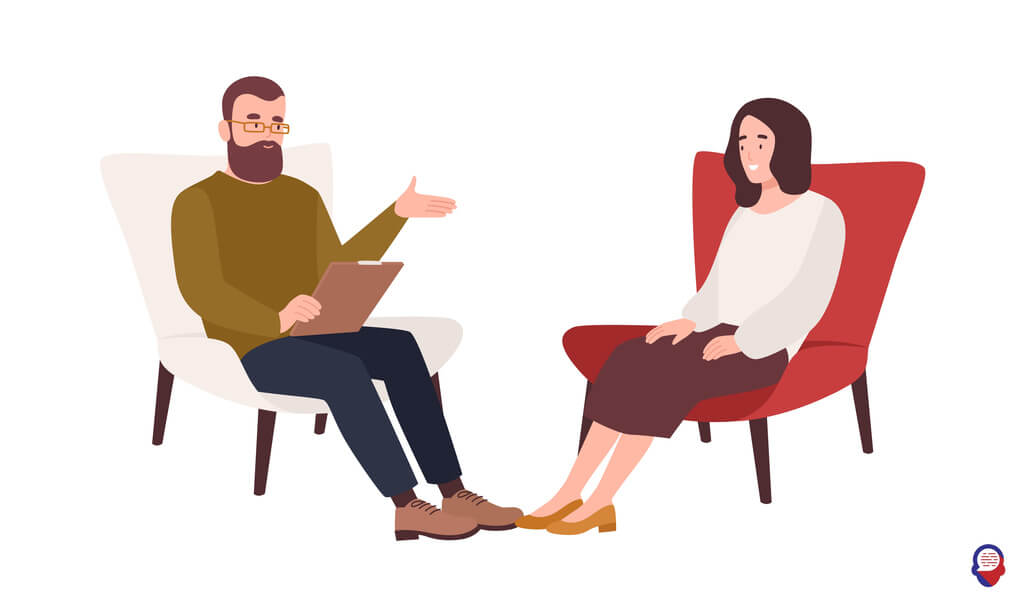Finding Your Way Through the Fog: A Guide to Depression Therapy
Living with depression can feel like navigating through a dense, disorienting fog. The world, once vibrant and clear, becomes muted and indistinct. Simple tasks loom like impossible mountains, and joy feels like a distant memory from another lifetime. It’s a heavy, isolating weight. But within that fog, there is a path forward, a way to find clarity and solid ground again. That path, for millions, is therapy.
This guide is not a promise of a magical cure, because the journey out of depression is rarely that simple. Instead, it is a map. It’s a detailed, compassionate exploration of what depression therapy is, how it works, and how it can empower you to reclaim your life from the shadows. It is a testament to the profound, science-backed truth that you do not have to go through this alone, and that healing is truly possible.

What Exactly Is Depression Therapy?
It is a confidential and collaborative process where you work with a trained professional to understand and manage your depression. Often called psychotherapy or counselling, it is a dedicated space for you to explore your thoughts, feelings, and behaviours in a safe, non-judgmental environment.
Therapy is so much more than just talking about your problems. It is an active, structured partnership designed to bring about meaningful change. Your therapist acts as a skilled guide, helping you to see patterns you might not notice on your own, challenging unhelpful beliefs, and equipping you with practical tools to navigate life’s challenges more effectively. The goal isn’t just to alleviate symptoms, but to build resilience for the future.

How Can Therapy Actually Help With Depression?
Therapy helps by providing a multi-faceted approach to healing, addressing the psychological, behavioural, and social factors that contribute to depression. It works by helping you rewire negative thought patterns, process difficult emotions, and develop healthier coping mechanisms.
This process empowers you to move from a state of passive suffering to one of active recovery. By gaining a deeper understanding of your own mind and building a toolkit of practical skills, you can fundamentally change your relationship with depression, reducing its power and influence over your life.

Can it change how I think?
Yes, a core function of many effective therapies is to help you identify and reshape the negative thought patterns that fuel depression. This is a cornerstone of approaches like Cognitive Behavioural Therapy (CBT).
Depression often distorts our perception, making us see the world through a lens of hopelessness and self-criticism. Thoughts like "I’m a failure" or "Nothing will ever get better" can become automatic and feel like absolute truths. Therapy teaches you to catch these thoughts, examine the evidence for and against them, and consciously replace them with more balanced and realistic perspectives.

Can it help me understand my past?
Yes, certain therapeutic approaches place a strong emphasis on exploring how your past experiences have shaped your present emotional landscape. Therapies like the psychodynamic approach help uncover links between early life events, relationships, and the depressive feelings you experience today.
This isn’t about blaming the past or dwelling on it unnecessarily. It is about understanding. By making sense of unresolved conflicts or unhealed wounds, you can loosen their grip on your current life, leading to profound insight and lasting emotional relief.

Can it teach me new skills?
Absolutely, one of the most powerful aspects of therapy is its focus on teaching practical, life-long skills. It goes beyond insight and delves into actionable strategies you can use every single day.
These skills can include mindfulness techniques to ground you in the present moment, communication strategies to improve your relationships, and problem-solving methods to tackle overwhelming situations. You can also learn distress tolerance skills to manage intense emotions without making things worse, building a robust toolkit for emotional resilience.

What Are the Different Types of Depression Therapy?
There are several highly effective, evidence-based therapies for depression, and the best one often depends on your individual symptoms, personality, and goals. There is no single "best" therapy, only the one that is the best fit for you.
A good therapist will often draw from multiple approaches to tailor the treatment to your unique needs. The key is finding a method and a practitioner that resonates with you and makes you feel understood and hopeful.

What is Cognitive Behavioural Therapy (CBT)?
Cognitive Behavioural Therapy, or CBT, is a practical, goal-oriented therapy that focuses on the interconnected relationship between your thoughts, emotions, and behaviours. It operates on the principle that by changing your negative patterns of thinking or behaving, you can change the way you feel.
CBT is typically structured and short-term, often lasting for a set number of sessions. You’ll work with your therapist to identify specific problems and develop strategies to overcome them. This often includes work outside of sessions, like keeping a thought diary or practicing new behaviours, making it a very active and empowering form of treatment.

What is Psychodynamic Therapy?
Psychodynamic therapy is an exploratory form of therapy that aims to uncover how your unconscious mind and past experiences influence your current feelings and actions. It helps you understand the deep-rooted origins of your depression.
This approach is often less structured than CBT and may be longer-term. The therapeutic relationship itself is key, as it can reveal patterns present in your other relationships. Through this deep, reflective work, you can gain profound self-awareness and resolve long-standing emotional conflicts.

What is Interpersonal Therapy (IPT)?
Interpersonal Therapy, or IPT, is a focused and time-limited therapy that directly links mood to our relationships and the events in our lives. It helps you identify and resolve interpersonal problems that may be causing or worsening your depression.
IPT sessions concentrate on one or two key problem areas in your relationships. These areas typically fall into four categories: grief over the loss of a loved one, conflicts in significant relationships, major life changes or transitions, or difficulties in forming and maintaining relationships. By improving your social support system and interpersonal skills, IPT effectively reduces depressive symptoms.

What is Dialectical Behaviour Therapy (DBT)?
Dialectical Behaviour Therapy, or DBT, is a comprehensive therapy that combines cognitive-behavioural techniques with concepts of mindfulness and acceptance. It is exceptionally effective at helping people manage intense, painful emotions.
Originally developed to treat borderline personality disorder, DBT’s skills-based approach is now widely used for depression, particularly when emotional dysregulation is a central issue. It teaches four key sets of skills: mindfulness, distress tolerance, emotion regulation, and interpersonal effectiveness. This provides a powerful framework for building a life you experience as worth living.

Are there other therapy options?
Yes, the field of psychotherapy is rich and varied, offering many other respected and effective approaches. Your choices extend far beyond the most common types.
Acceptance and Commitment Therapy (ACT) helps you accept difficult feelings rather than fighting them, and commit to actions guided by your core values. Mindfulness-Based Cognitive Therapy (MBCT) combines CBT with mindfulness meditation to help prevent depressive relapse. Humanistic therapies focus on your innate capacity for personal growth and self-actualisation. The right path is the one that empowers you.

What Should I Expect From My First Therapy Session?
Your first therapy session is primarily an opportunity for you and your therapist to get to know each other and determine if you are a good match. It is less about deep therapeutic work and more about assessment and building a foundation.
You can expect the therapist to ask questions about what brought you to therapy, your symptoms, your personal history, and what you hope to achieve. This is also your time to ask questions and get a feel for their style and approach. The main goal is to leave with a sense of whether you feel comfortable, safe, and understood by this person.
Remember, you are in control. You do not have to share anything you are not ready to share. The session is a two-way interview, and it is perfectly okay if the first therapist you meet is not the right one for you. Confidentiality is paramount, and everything you discuss is protected from this very first meeting.

How Do I Find the Right Therapist for Me?
Finding the right therapist is a crucial step that involves a combination of practical research and personal intuition. The right fit is determined by their qualifications, their therapeutic approach, and, most importantly, the quality of the connection you feel with them.
This process can feel daunting, but it is an investment in your wellbeing. Think of it not as a test you have to pass, but as a search for a trusted ally who will join you on your journey. Taking the time to find the right person can make all the difference in your therapeutic outcome.

What qualifications should I look for?
You should look for a therapist who is professionally trained, licensed, and accredited by a recognised professional body. In the UK, this includes organisations like the British Association for Counselling and Psychotherapy (BACP) or the UK Council for Psychotherapy (UKCP).
These credentials ensure that the therapist has met rigorous standards for education and training and adheres to a strict code of ethical conduct. Many therapists also list specialisms, so you can look for someone with specific experience in treating depression.

How important is the therapeutic relationship?
It is arguably the single most important factor in successful therapy, often more so than the specific type of therapy used. Decades of research have shown that a strong therapeutic alliance, built on trust, empathy, and rapport, is the primary predictor of positive outcomes.
You need to feel that your therapist genuinely cares, listens without judgment, and respects your perspective. This safe and supportive relationship is the container in which healing and growth can happen. If you don’t feel that "click" after a few sessions, it is valid and wise to seek out a different therapist.

What questions should I ask a potential therapist?
Asking questions during an initial consultation empowers you to make an informed decision. It is completely appropriate to interview a potential therapist to see if they meet your needs.
Consider asking questions like: "What is your experience in helping people with depression?", "Can you describe your therapeutic approach?", "What might a typical session with you look like?", "What are your fees, cancellation policy, and availability?". Their answers will give you valuable insight into their practice and whether it aligns with what you’re looking for.

How Can I Make the Most of My Therapy?
You can maximise the benefits of therapy by approaching it as an active and engaged participant. The more you put into the process, both inside and outside of your sessions, the more you will get out of it.
Therapy is not something that is "done" to you, it is something you "do". It is a partnership where your commitment and effort are just as important as the therapist’s skill. By embracing this collaborative spirit, you can accelerate your progress and create more profound, lasting change.

Should I be completely honest?
Yes, honesty is the bedrock of effective therapy. While it can be incredibly difficult to talk about your deepest fears, regrets, or feelings of shame, being open is essential for your therapist to truly understand and help you.
A professional therapist is trained to create a safe, confidential, and non-judgmental space. They have heard a vast range of human experiences and are not there to judge you, but to support you. The more you can trust the process and share your authentic self, the more powerful the work will be.

What if I don’t know what to talk about?
It is completely normal and very common to arrive at a session not knowing what to say. You do not need to prepare a script or have a crisis to have a productive session.
A skilled therapist can help guide the conversation. You can simply start by saying, "I’m not sure where to begin today." Often, just exploring that feeling of uncertainty can lead to important insights. You could also discuss a small moment from your week, a dream you had, or a feeling that is present for you in that moment.

Does the work happen outside of sessions too?
Yes, a significant portion of the therapeutic work happens in the days between your appointments. The therapy room is like a laboratory where you learn new skills and gain insights, but your life is where you practice and apply them.
This might involve consciously challenging a negative thought as it arises, practicing a mindfulness exercise when you feel stressed, or trying a new way of communicating with a loved one. The more you integrate the lessons of therapy into your daily existence, the more you will solidify your progress and build lasting resilience.
Frequently Asked Questions

How long does depression therapy take?
The duration of therapy is highly individual and there is no set timeline. It depends on factors like the severity and chronicity of your depression, the type of therapy you engage in, and your personal goals. Some focused, structured therapies like CBT may last for 12 to 20 sessions, while more exploratory approaches like psychodynamic therapy can be longer-term. The goal is not to stay in therapy forever, but to stay for as long as it is helpful.

Is therapy for depression expensive?
The cost of therapy can be a significant concern, and it varies widely based on the therapist’s qualifications, location, and the type of practice. While it requires a financial commitment, it is most helpful to view it as a vital investment in your long-term health and wellbeing, much like you would invest in your physical health. Some services may offer sliding scale fees based on income, and it is always worth discussing costs upfront with a potential therapist.

What if I feel like therapy isn’t working?
This is an important and valid feeling to address. If you’ve been attending sessions for a while and feel you aren’t making progress, the first and best step is to talk about it with your therapist. An open conversation can often lead to a shift in approach that gets things back on track. It could also be that the therapeutic fit isn’t quite right, and a good therapist will support you in finding someone else who may be a better match for your needs.

Can I do therapy alongside medication?
Yes, for many individuals, especially those with moderate to severe depression, a combination of therapy and antidepressant medication is the most effective treatment approach. Medication can help alleviate the most debilitating physical and emotional symptoms, creating the mental space and energy needed to engage more fully in the deeper work of therapy. Therapy, in turn, provides the skills and insights to manage depression long-term. It is crucial to coordinate this care between your therapist and the prescribing doctor.
Your journey through life’s challenges doesn’t have to be walked alone. At Counselling-uk, we provide a safe, confidential, and professional place for you to get advice and help with your mental health. We are here to offer support for all of life’s challenges.
Reach out today to start the conversation. We’re here to help you find your way.





2. Be Open and Honest: It is important to be open and honest about how you are feeling in order to get the most out of therapy. Your therapist needs to get an accurate picture of what is going on in order to provide effective treatment, so be sure to tell them everything that is on your mind.